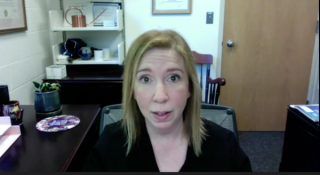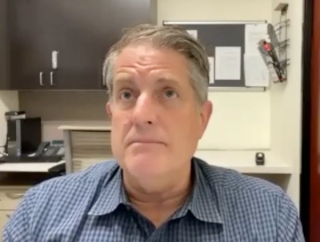
Female Urology
Latest News
Latest Videos

CME Content
More News

Dietary or supplemental antioxidants do not appear to be associated with a decreased risk of prostate cancer among men in the Prostate, Lung, Colorectal, and Ovarian (PLCO) Cancer Screening Trial, suggests a study published last month in the Journal of the National Cancer Institute (2006; 98:245-54).

Baltimore--Psychological treatment, particularly cognitive behavioral therapy, can help ease chronic pain. That's why these therapies may be able to do the same for chronic prostatitis/chronic pelvic pain syndrome (CP/CPPS) patients, argued Judith Turner, PhD, at the NIDDK-sponsored Chronic Pelvic Pain/Chronic Prostatitis Scientific Workshop here.

Fiber is cleared for use with Holmium laser in BPH

Baltimore?What causes chronic pain in chronic prostatitis/chronic pelvic pain syndrome (CP/CPPS)? This could be the wrong question to ask, said Jeffrey S. Mogil, PhD, at the NIDDK-sponsored Chronic Pelvic Pain/Chronic Prostatitis Scientific Workshop. The better question may be: Why do these particular men have chronic pain, whereas others do not?

Researchers are taking a broader view of chronic pain that will allow development of new treatment strategies.

The use of opiates in chronic nonmalignant pain has its share of proponents and opponents among urologists who specialize in chronic pelvic pain.

Baltimore--Scientific thinking about pain in general and chronic pain in particular has changed drastically in the last 50 years. Providers who treat chronic pain syndrome, such as chronic prostatitis/chronic pelvic pain syndrome (CP/CPPS), need to discard the old models if they are going to help patients.

In one study, 85% of the CP/CPPS patients had decreased frequency of sexual contact because of their pain, 67% said it interfered with or ended relationships, and 43% said it inhibited forming new relationships.

Baltimore--Psychological treatment, particularly cognitive behavioral therapy, can help ease chronic pain. That's why these therapies may be able to do the same for chronic prostatitis/chronic pelvic pain syndrome (CP/CPPS) patients, argued Judith Turner, PhD, at the NIDDK-sponsored Chronic Pelvic Pain/Chronic Prostatitis Scientific Workshop here.

Past terminology has held management back, Dr. Baranowski argued. The 'itis' of prostatitis, for example, has encouraged patients to seek anti-inflammatory or long-term antibiotic therapies that often don't help.

Baltimore?Someday, you may be using neurophysiologic testing for follow-up and possibly even diagnosis of chronic prostatitis/chronic pelvic pain syndrome (CP/CPPS) before you turn to the four-glass or modified test. That's because, increasingly, CP/CPPS is being recognized not as a disorder of the prostate, but as a neurologic disorder?a chronic pain syndrome that may begin in the viscera, but becomes a nervous system disorder as pain is centralized.

Baltimore--As the focus on pelvic pain syndromes moves away from the organs to the nervous system, researchers such as Ursula Wesselmann, MD, PhD, are trying to find out how acute pain develops into chronic pain.

Montreal--Men with a body mass index indicative of being overweight or obese may exhibit changes in endocrine levels—notably lower testosterone levels—that could contribute to infertility, new research shows. It is possible, therefore, that fertility problems could be ameliorated with weight loss in some men.

Montreal--In case your patients need another reason to quit, recent research indicates that smoking tobacco reduces the ability of sperm to fertilize an egg. There appears to be a dose-response relationship, with heavy smokers at greater risk for more severe impairment of sperm, according to a study presented at the American Society for Reproductive Medicine annual meeting here. It remains to be seen whether quitting smoking or even cutting down will lead to improvements in sperm functions that support fertilization.

Montreal--Idiopathic, primary nonobstructive azoospermia (NOA) is linked to a genetic defect known as a dysfunctional DNA mismatch repair pathway that also places these men at increased risk for cancer and other medical illnesses. Given that the problem is genetic in origin, the consequences of this defect may be of significance for both patients and their offspring, researchers say. Both concerns require close monitoring by physicians.

Montreal--The anti-estrogen agent clomiphene citrate (Clomid, Milophene, Serophene) may provide an easier, less expensive treatment for infertility among some men with hypogonadotropic hypo-gonadism [HH], according to a small retrospective study. The agent may be worth trying before the more expensive and difficult-to-administer gonadotropins are employed.

Montreal--As the controversy over whether to perform vasovasostomy or vasoepididymostomy for vasectomy reversal rages, two small studies have provided some new insight into when to choose one surgical technique over the other. One study demonstrates that expert surgeons can provide better results with vasoepididymostomy among patients with vasospermia, defined as no sperm in the vasal fluid, regardless of the condition of the vasal fluid. The second study suggests that the presence of sperm parts in the vasal fluid signals that vasovasostomy might be the better option.

Montreal--Although testicular sperm extraction (TESE) may provide somewhat better pregnancy rates than the use of ejaculated sperm for intracytoplasmic sperm injection for men with low sperm counts, a higher-than-average proportion of abnormal sperm, or almost no sperm in the ejaculate, TESE does have important disadvantages. It is up to patients and their physicians to choose the appropriate procedure, based on individual circumstances and clinical features, researchers say.

Montreal--The level of inhibin B may be a better marker of male infertility than both the typically used follicle stimulating hormone (FSH) and luteinizing hormone (LH), according to new research. These findings have yet to be confirmed in a large, prospective trial, however.

Washington--For children with ambiguous genitalia at birth, surgical techniques have improved vastly, but deciding when and whether to do surgery hasn't gotten easier. That was apparent from the lively and sometimes contentious panel and audience discussion here at the American Academy of Pediatrics Section on Urology annual meeting.

I predict that we will find that MR urography will rapidly develop and eventually come to be the imaging technique of choice in adult and pediatric urology.

Montreal--Spermatogenesis markers that can be easily obtained from a noninvasive testis biopsy may predict which patients will respond to surgical varicocele repair. Testis biopsy, therefore, should be part of the regular workup for male infertility patients, suggest the authors of the 2005 Society for Male Reproduction and Urology Prize paper presented here at the American Society for Reproductive Medicine annual meeting.

Washington--When hydronephrosis is diagnosed antenatally in an infant, is pyeloplasty needed? More often than not, the indication is not clear.

Men with infertility and abnormal sperm counts have a 20-fold greater incidence of testicular cancer than men in the general population, according to a study published in the Journal of Urology (2005; 174:1819-22).

Washington--Counterfeit prescription drugs pose a "potentially serious health threat" in the United States, one that can result in serious or deadly consequences for patients because of unscrupulous acts of profiteers who take advantage of a lack of uniform regulation and enforcement.





